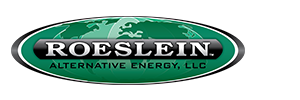‘Horizon II’ Pilot Project to Demonstrate How Farmers Get Environmental Credit Compensation and Renewable Energy Revenue by Planting Prairie Grasses and Cover Crops
St. Louis, MO – September 14, 2022 – A partnership of 14 public and private entities led by Roeslein Alternative Energy (RAE) has been awarded $80 million from the federal government’s first pool of funds from the U.S.D.A’s Partnerships for Climate-Smart Commodities program. The funding will be used in a five year pilot project in Iowa and Missouri called ‘Horizon II’ to demonstrate a “Climate-Smart Future for Corn, Soybean, Livestock, and Renewable Natural Gas Production.”
The Horizon II project will enhance climate-smart markets, reduce greenhouse gas emissions, and improve carbon sequestration in the production of corn, soybean, pork, and beef commodities, while creating opportunities for small and underserved producers and benefitting soil health, clean water, flood control, and habitats for native wildlife.
Horizon II: Environmental and Wildlife Benefits from Renewable Energy Production
The grant award is a major step toward advancing RAE’s core mission to develop a market-based solution that puts an economic value on restored native grasses and prairie plants, by using the sustainably harvested biomass to create renewable natural gas.
“Since founding RAE, our overarching goal has been to provide farmers an alternative way to use land, especially highly erodible acres, in ways that will benefit the environment, wildlife, and their own livelihood,” said Rudi Roeslein, RAE Founder and CEO. “This funding will propel Horizon II forward more rapidly than otherwise would have been possible. We will show how farmers and landowners can do well for themselves while also providing ecological services and wildlife benefits.”
Pilot Program in Iowa and Missouri
A pilot will be developed, deployed, and verified in Iowa and Missouri, where much of the nation’s corn, soybeans, and pork are produced. Horizon II seeks to incentivize improved management of nitrogen fertilizer and other inputs on agriculture land, which is critical to the success of climate-smart practices.
- Farmers, livestock producers, and landowners will be compensated for GHG reductions and carbon sequestration in the soil through an outcomes-based carbon credit program.
- Cover cropping and grassland restoration will be further incentivized through a novel, market-based program that supports renewable natural gas (RNG) production through the anaerobic digestion of herbaceous biomass combined with manure.
- This renewable energy can be fed into the national grid and become part of the sustainable new value chain.
- Program partners will collaborate with farmers, livestock producers, landowners, and other stakeholders, including early adopters of practices and historically underserved producers, to ensure equitable access to the opportunities offered by the low-carbon agriculture of the future.
Horizon II Partner Organizations
Partner organizations involved in the RAE Horizon II project are: Biostar Renewables, Conservation Districts of Iowa, Iowa Agriculture Water Alliance, Iowa Soybean Association, Iowa State University, Missouri Prairie Foundation, Sievers Family Farms, Soil and Water Outcomes Fund, Smithfield Foods, The Nature Conservancy, University of Missouri, Verdesian, and Veterans in Agriculture.
“Iowa State University has been working with Roeslein Alternative Energy and many additional partners for nearly a decade, laying the foundation for a climate-smart commodity supply chain based on the anaerobic digestion of prairie grasses and winter hearty crops along with manure,” said Lisa Schulte-Moore, Department of Natural Resource Ecology and Management and co-director of the Bioeconomy Institute at Iowa State University. “I’m excited and thankful for this tremendous investment by USDA toward commercializing our research and development, with the goal of closing system loops to return more value from agriculture to people and the land.”
Once fully developed, deployed, and verified, the program can be extended and tailored to other agricultural commodities (i.e., dairy, poultry) and regions of the country. While focused on GHG reduction and soil carbon storage, these climate-smart agricultural systems will add further value in terms of soil health, clean water, flood control, and habitat for native wildlife.
“We are thrilled to partner on this transformational project that will drive adoption of prairie strips and cover crops; create clean, renewable natural gas; improve water quality, address climate change and improve America’s energy independence,” noted Sean McMahon, Executive Director of the Iowa Agriculture Water Alliance.
About Roeslein Alternative Energy, LLC
Roeslein Alternative Energy (RAE) is the owner, operator and developer of renewable energy production facilities that convert agricultural and industrial wastes, along with renewable biomass feedstocks to renewable natural gas and sustainable co-products. RAE engages in these business operations with a focus on incorporating native prairie restoration. RAE is a limited liability company with its principal offices located in St. Louis, Missouri. RAE was launched in 2012 by Rudi Roeslein, co-founder and CEO of St. Louis-based Roeslein and Associates, Inc. (a global leader in engineering, modular fabrication, and construction of industrial plant facilities).
Contacts:
Brandon Butler
Roeslein Alternative Energy
660-281-9804
[email protected]

